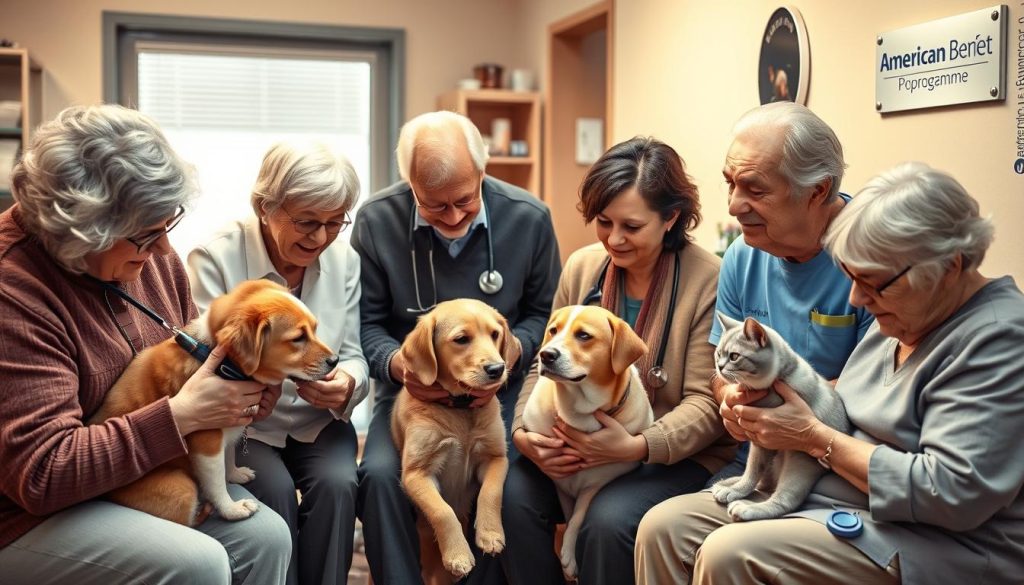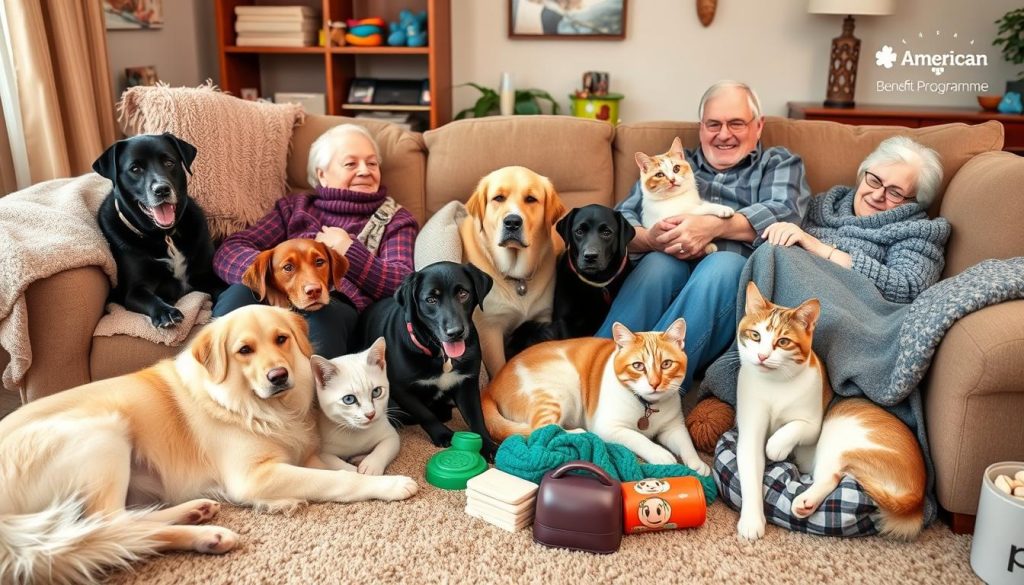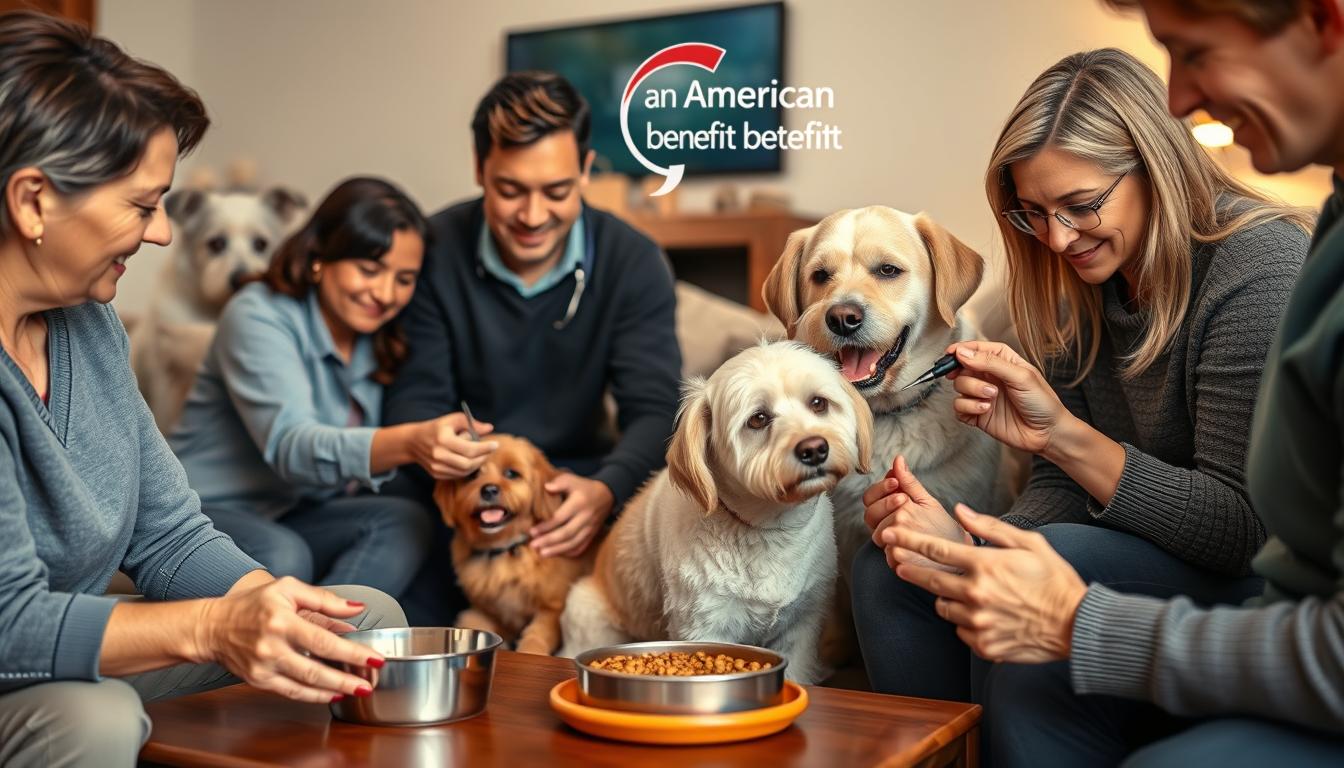Do pets face health challenges as they get older? Yes, they do. As pets age, they need special care. Today, pets live longer thanks to better vet care. This guide shows pet owners in the U.S. how to care for older pets. It covers everything important for their health. You’ll learn about proper food, exercise, and vet visits. Plus, it talks about common problems old pets face. This will help you support your older pets through their senior years. Helping your pets stay healthy as they age is very important.
Key Takeaways
- Senior pets require unique care considerations as they age.
- Regular veterinary examinations are essential for early detection of health issues.
- Nutrition plays a pivotal role in maintaining the health of aging pets.
- Exercise routines should be adjusted to meet the needs of senior pets.
- Identifying and managing common age-related conditions can enhance your pet’s quality of life.
- Utilizing specialized services can help provide the best care for senior pets.
- Awareness of available resources can ease the financial burden of senior pet care.
Understanding Senior Pet Care Needs
Older pets need different care compared to young ones. They may have health issues like arthritis or diabetes. These require special senior pet care services1. It’s vital to see a vet every six months. This helps catch problems early2. Also, feeding them the right food keeps them from getting too heavy3.
Creating a good exercise plan is key for older pets2. A vet can give advice on the best exercises for them3. Making their home comfortable is also important. Things like soft beds and ramps can make a big difference1. All these steps help our older pets stay happy and healthy.
Why Senior Pets Require Extra Care
Senior pets go through big changes that affect their health. Dogs become seniors at about seven years old. Cats reach this stage at eleven4. Knowing how to care for older pets is key. This is because older dogs and cats need special care to stay happy and healthy.
Older pets may not move as easily and can think less clearly. They also need different food that’s easier to digest. This keeps them from getting too heavy4. Seeing the vet often, at least twice a year, is very important. The vet checks their health, teeth, and how well they move5.
Keeping up with their shots is important even when they’re old. Talking to the vet about any changes in how they act is crucial4. This is because changes might mean they are in pain or have other problems. Many older pets get arthritis and need treatment to feel better4.
To sum it up, knowing what older pets need helps us take better care of them. Owners of older dogs and cats must be careful and ready. They have to face the problems that come with age.
Common Age-Related Issues in Senior Pets
Older pets face many health problems that need extra care. Arthritis is a big issue that affects almost all old pets. It makes moving hard for them6. This can lead to more problems like getting overweight and feeling sad7. Next, older pets may get “doggie dementia,” similar to Alzheimer’s in people6. This makes them confused and lost, making care harder as they age7.
Heart and kidney diseases are also big risks for aging pets8. We can’t ignore dental health. Many old pets have dental diseases, causing tooth loss and infections6. These issues can cause even more serious problems, like harm to important organs7.
Keeping old pets at a healthy weight is very important. More than half of old dogs are overweight. This makes them more likely to get sick with diabetes and heart problems8. Owners must watch for any changes in their pet’s health or behavior. Going to the vet regularly helps find and treat these problems early. This improves the health and happiness of old pets.
| Health Issue | Common Symptoms | Impacts on Senior Pet Health | Prevention & Care |
|---|---|---|---|
| Arthritis | Decreased mobility, stiffness | Pain, potential obesity | Regular vet visits, weight management |
| Cognitive Dysfunction | Disorientation, confusion | Insecurity, behavioral changes | Mental stimulation, routine |
| Heart Disease | Coughing, fatigue | Shortened lifespan, quality of life | Heart-healthy diet, vet check-ups |
| Kidney Disease | Increased thirst, weight loss | Severe health decline | Yearly blood tests, hydration |
| Dental Disease | Bad breath, swollen gums | Potential organ damage | Regular dental cleanings |
| Obesity | Excess weight, lethargy | Increased disease risk | Proper diet and exercise |
The Importance of Regular Veterinary Examinations
Senior pets need more care as they get older. Dogs become seniors at age 7 and cats at 109. Vets check their health by doing tests like blood work and X-rays10. This helps find any health problems early, leading to better chances of treatment.
Older pets often have issues like arthritis or kidney disease11. They should visit the vet at least twice a year for check-ups10. This helps manage their health better over time.
Vet visits also give tips on food and exercise that fit their age. Dental care is also very important9. Watching for changes in how they act is key for their wellbeing9. So, seeing the vet regularly is very important for their happiness.

Nutrition Tailored for Senior Pets
Nutrition is key for senior pets to live well. Their meals need to fit their special health needs. This is because older pets face different health challenges.
Dietary Considerations for Senior Dogs
Older dogs often need less calories because they move less. Big dogs get old faster, around 6-7 years. Smaller ones age slower, becoming seniors at 9 or more12. Right food helps keep their weight in check. It’s important since overweight dogs can have worse joint problems13.
They also need good protein to stay strong and energetic. This protein must be easy for them to digest12. Dogs with kidney issues may need special food. It has less protein and phosphorus12.
Dietary Considerations for Senior Cats
Older cats also need top-notch protein that is easy to digest. This helps them stay active and healthy12. Many face teeth problems, so their diet should help with that13. They might need softer food because they can have trouble eating12.
Adding fruits and veggies helps with their immune system. It fights off harmful oxidative stress12. Half of the older pets might need special diets based on their health13.
Appropriate Exercise for Senior Pets
It’s very important to keep senior pets moving for their health. Dogs often become seniors by the age of 7. Bigger dogs may get there quicker, at ages 5 to 6. Smaller dogs might not be seniors until they’re about 1014. They should get 30 to 60 minutes of exercise every day. This can be split up into shorter times14. Walking is a great exercise that is easy on their bodies. It also helps them stay both physically and mentally sharp. It’s perfect for older dogs15.
Swimming is another soft exercise that works out the whole body. It’s really good for pets with joint pain or trouble moving15. Trying things like dog yoga or Pilates can help your dog feel better in their mind and body. This is good for dogs of any age15. Including things like training for obedience and recall can also keep your older dog’s brain working well. It helps them stay active14.
Make sure to watch senior pets closely when they exercise. They can be more affected by changes in the weather. This can change how much they can do15. For those with arthritis, moving regularly in a gentle way can help ease pain. It also keeps their bones and muscles healthy16. It’s smart to slowly start new exercises. This lets pets get used to more exercise over time16.
Having a good mix of activities for your older pet helps their body stay strong. It also makes their life better.
| Exercise Type | Benefits | Recommended Duration |
|---|---|---|
| Walking | Maintains physical health, promotes mental stimulation | Two 30-minute walks per day |
| Swimming | Low-impact, total-body workout, gentle on joints | Varies, based on comfort and health |
| Training (Obedience/Recall) | Stimulates mind, encourages movement | 10-15 minutes sessions, multiple times a week |
| Puzzles/Toys | Encourages physical activity and mental engagement | As desired, based on pet’s interest |
Senior Pet Grooming Essentials
Grooming is very important for older pets’ comfort and cleanliness. As pets get older, they need more care with their fur, skin, and moving around. Knowing how to care for them makes their life better.
Grooming Needs for Older Dogs
Older dogs need special care to stay healthy. Brushing them often is key. It stops knots and keeps their fur looking good. They don’t need baths too often, just once a month. Some with thick fur might only need a bath every six months17. Their nails also need care. Long nails hurt them when they walk17. It’s best to cut their nails so they don’t touch the ground17.
Ear care is important too for older dogs. Checking and cleaning ears stops infections. This is vital as older dogs get sick easier17. Grooming also helps find health issues early. This means they can get help quicker18.
Grooming Needs for Older Cats
Older cats also have their own grooming needs. They may struggle to clean themselves. Brushing them helps keep their fur smooth and stops skin problems. It also reduces hairballs, which are common in older cats18. They don’t need many baths, but some now and then help keep their skin healthy.
Grooming is also good for cats who have a hard time moving. It helps spot any changes in their body that need a vet’s look18/>.
| Grooming Aspect | Older Dogs | Older Cats |
|---|---|---|
| Brushing Frequency | Regular; prevents matting | Frequent; prevents hairballs and skin issues |
| Bathing | Once a month; up to six months for certain coats | Occasional; based on grooming needs |
| Nail Trimming | As needed; essential for comfort | As needed; usually less frequently than dogs |
| Ear Care | Regular cleaning to prevent infections | Less frequent; monitor for issues |
Understanding Senior Pet Health and Wellness
Maintaining senior pet health means looking after their bodies and minds as they get older. Smaller dogs often become seniors between 10-12 years, and big dogs around 6-8 years. Cats usually hit this stage at about 11 years19. It’s important to keep up with vet visits to catch any health issues early19.
At these vet visits, pets might get blood and urine tests. Vets also talk about food changes for better health19. Pets that are too heavy or too light might have health problems. For ones with arthritis, treatments like acupuncture can make them feel better and move easier19.
Cats should see the vet every year until they’re 8. Then, they should go more often20. These visits can help find and manage problems like kidney disease or diabetes. It’s also key to watch for signs like losing weight, drinking more, or eating less20.
Pet owners need to give lots of love and keep their older pets happy and active. It’s a big change as pets get older, but it can make their lives better. To learn more about caring for older pets, look at this guide on senior pet wellness.

Managing Chronic Conditions in Senior Pets
Helping older pets with chronic conditions takes care and effort. Pets usually become seniors when they are 7. They may start to get health issues like arthritis, diabetes, and dental problems2122. A good care plan from a vet might involve medicine, special diets, and changes in daily life22.
It’s very important to have vet check-ups twice a year23. This helps find any health problems early on. Blood tests can show if there are diseases like kidney problems that many older pets get21. Owners should watch for any small changes in their pets. This includes eating, how they clean themselves, and how much they move22.
What older pets eat is very important for their health. Their food should have fewer calories but still have things that are good for them like omega-3s and antioxidants2123. Products like glucosamine are helpful for sore joints and arthritis22.
A pet’s home should be safe and comfy. This means beds that support them and floors they can’t slip on22. Gentle exercises like walking or swimming are good. They keep pets happy and help them stay flexible21.
Dealing with chronic conditions well means looking after the pet’s body and mind. This helps senior pets have a good life2223.
Senior Pet Care Services: Finding the Right Help
It’s important to find good senior pet care to make aging pets happy. Some pet parents might need extra help. This could be a trusted pet sitter or dog walker. Resources for senior pets that offer financial help are also valuable24. Caring for old pets is different. They need services that understand their special needs and problems24.
Looking for care for old pets? Think about local vet clinics that focus on older pets. Take Caring Hands Veterinary Clinic in Philadelphia, PA, as an example. They offer shots, dental care, and digital pictures for older pets24. When pets get care from experts, they are in good hands. This care helps with common old pet diseases like arthritis and heart disease24.
There are ways to make caring for old pets less costly. Many seniors find pets help them feel better, both emotionally and physically25. There are options to help pay for unexpected vet visits. Pet health insurance can also help cover costs. It can save money on treatments25.
Finding the right help is key. This help should offer both professional care and emotional support. Joining local groups can be a big help. These groups share tips and help with problems in caring for old pets. Working together with these resources makes pets’ futures brighter and more comfortable.
Conclusion
It’s very important to keep senior pets happy and healthy. This guide shows how to care for older pets. It talks about their food, fun activities, keeping them clean, and seeing the vet often. As pets get older, they face new health challenges. Going to the vet every six months helps catch these problems early. Special food can help with things like sore joints and keeping a healthy weight2627.
It’s also key to know about issues like arthritis and brain health. Cleaning their teeth, fun toys, and a safe home help them feel better2827. Making small changes for their age is something every pet owner should do.
Caring for your older pets means more than just time together. It helps them have a good, happy life. This guide gives you the tools to care for them well. You can make sure your pet enjoys their older years2628.
Source Links
- A Comprehensive Guide to Nurturing Senior Pets
- Senior Pet Care | Winder Animal Hospital
- The Animal Hospital
- Senior Pet Care | Veterinarian in Summit, NJ | Summit Dog & Cat Hospital
- How Often Should I Take My Senior Pet to the Veterinarian?
- Senior Pets: Old Age is Not a Disease!
- Common Senior Pet Health Conditions – Bolton Veterinary Hospital
- Senior Dogs 101: Common health issues in senior dogs
- Senior Pets Need Special Care: What You Should Know | Veterinary Care And Specialty Group
- The Importance Of Regular Vet Visits For Senior Pets
- Why Regular Veterinary Check-Ups Are Crucial for Your Senior Pet’s Health – Adobe Animal Hospital & Laser Surgery Center
- Senior Pet Right Diet: A Complete Nutrition Guide
- Tailored Nutrition for Small & Mini Senior Dogs – Premium Dry Dog Food, 4.5 lb | eBay
- How To Exercise Your Senior Dog
- No title found
- How to Keep Your Senior Pet Active and Engaged
- Grooming and Environment – The Senior Dogs Project
- Grooming Senior & Special Needs Dogs | Handicapped Pets Blog
- A Comprehensive Guide to Senior Pet Wellness | Whitney Veterinary Hospital
- Senior Pet Health & Wellness – Park Veterinary Hospital
- Senior Dog Care: A Focus on Silver Snouts and Aging Dog Wellness
- How to Manage Chronic Pain in Senior Pets: Tips and Strategies | Whitney Veterinary Hospital
- The Golden Years: What You Should Know About Senior Pet Care – Rainier West Vet
- Senior Pet Care | Veterinarian in Philadelphia, PA | Caring Hands Veterinary Clinic
- Where To Find Pet Care Assistance For Seniors
- Caring For Your Senior Pet: A Comprehensive Guide To Their Health And Happiness | AAA Animal Hospital
- 11 Tips to Help Your Senior Pet – World of Animals Veterinary Hospital, Inc.
- Senior Pet Care: Enhancing Your Pet’s Golden Years

Leave a Reply